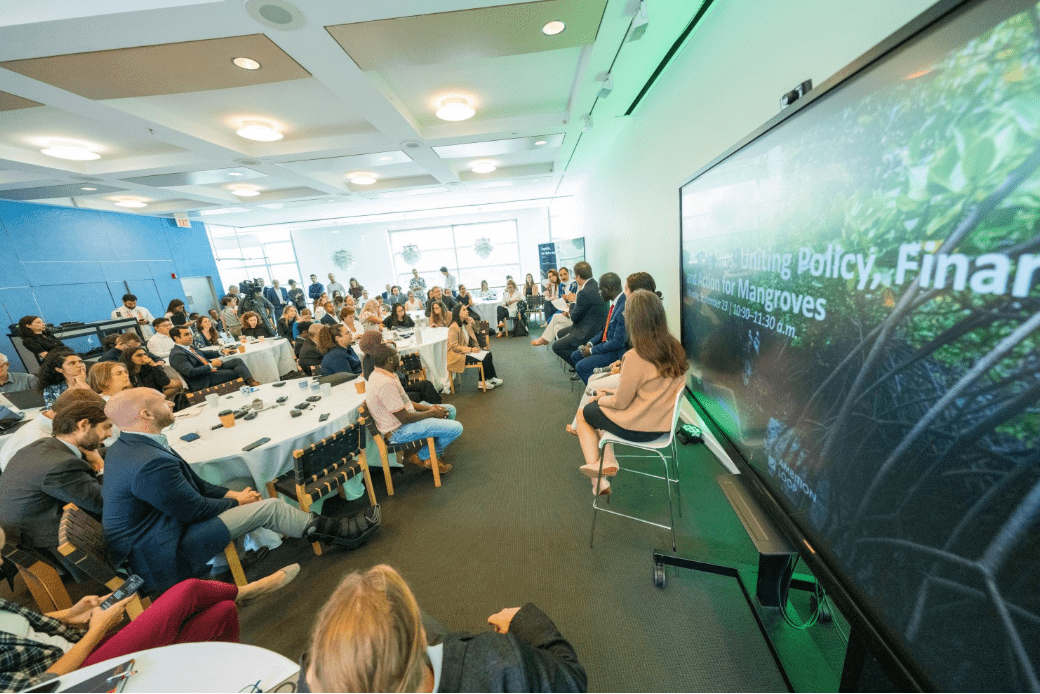Breaking Silos for Mangrove Action at New York Climate Week
by Anelise Zimmer, Pew Charitable Trusts
This week mangrove stakeholders from around the world convened at New York Climate Week to drive policy and finance to achieve the ambitious goals of the Mangrove Breakthrough, a global initiative that seeks to protect and restore 15 million hectares of mangroves worldwide by 2030.
As coastal wetlands, mangroves provide countless benefits to society and nature. They enhance coastal resilience in the face of flooding and storms, they sequester and store more “blue” carbon than any other ecosystem (per unit area), and they provide critical habitat for biodiversity, including economically important fish species.
Mangroves are one of the most threatened ecosystems on the planet. Deforestation, development, and pollution all threaten mangrove ecosystems, as do climate change impacts, including sea level rise and the increased frequency of intense storms.
In fact, more than half of all mangrove ecosystems are at risk of collapse, according to a recent global assessment by the International Union for Conservation of Nature (IUCN) and more than 250 experts. This means more than 50% of mangrove ecosystems assessed are classified as either Vulnerable, Endangered, or Critically Endangered by the IUCN Red List of Ecosystems, a globally recognized standard for the health of nature.
Despite that grim news, governments and other stakeholders can reverse the trend of mangrove loss. The Mangrove Breakthrough lays out science-based targets and a financial roadmap to secure the future of 15 million hectares of mangroves globally by 2030 by:
• Halting mangrove losses,
• Restoring half of recently lost mangroves,
• Doubling the protection of mangroves globally, and
• Ensuring sustainable long-term financing for all existing mangroves by securing an investment
of $4 billion by 2030 to conserve and revitalize these coastal ecosystems.
To date, 29 governments and more than 50 non-state actors have endorsed the Mangrove Breakthrough. Those endorsements must now lead to action. The “Breaking Silos: Uniting Policy, Finance, and Action for Mangroves” event on September 23rd hosted by The Nature Conservancy at New York Climate Week sought to bridge the gap between policy, finance, and on-the-ground action to catalyze transformative change in mangrove conservation and restoration.
Key takeaways from the event
The importance of national policy action and local community buy-in: Dr. Emmanuel Urey Yarkpawolo, Executive Director and CEO of Liberia’s Environmental Protection Agency highlighted the importance of communicating national ambition to conserve mangroves within Liberia’s Nationally Determined Contribution (NDC) to the Paris Agreement to catalyze policy action and attract investment. Dr. Yarkpawalo also emphasized the importance of engaging local communities on mangrove action with the reminder that “if Liberians protect mangroves, then mangroves will protect Liberians.”
Innovative finance solutions: Jenny McInnes, Global Head of Policy and Partnerships at HSBC, noted the importance of innovative finance solutions, like blue bonds, that address the root causes of mangrove degradation, such as polluted wastewater runoff, to ensure lasting conservation outcomes.
Thoughtful grantmaking: Emily Averna, Program Officer for Land Restoration at Bezos Earth Fund, emphasized the importance of funders designing grant programs that support ecologically appropriate and locally led mangrove projects at various scales.
To support the success of the Mangrove Breakthrough, Pew Charitable Trusts, in collaboration with partners from the Global Mangrove Alliance and the UNFCCC High-Level Climate Champions, leads the Mangrove Breakthrough NDC Task Force. This initiative assists Mangrove Breakthrough governments in transforming their endorsements into ambitious mangrove conservation targets in their revised NDCs, which are due to the UNFCCC in 2025. By providing technical policy and data guidance, the NDC Task Force helps governments enhance their mangrove-climate action through clear, ambitious, and science-based NDC targets.

Ambition Loop's Nigel Topping moderated a panel featuring representatives from Liberia, the United Arab Emirates, HSBC, Bezos Earth Fund, and Rare at New York Climate Week. (Photo credit: Ambition Loop)